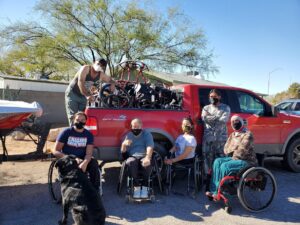We All Need to Step up in a Crisis
Partnership with our grantees means providing clear funding guidelines, open communications, and decision making that is rooted in our mission, vision, and values. It also means that, in times of crisis, we must be proactive and flexible, responding to the immediate needs of the spinal cord injury (SCI) community. This was inspired by our Founder, Craig H. Neilsen, and the work we do today is driven by the values important to him during his lifetime.

It can be difficult for organizations to shift the way they do things but, because disaster can strike at any moment, we need to be ready to help those in need. Every catastrophe creates challenges for daily life and disruption of operations for organizations that serve the community, and people with disabilities often face the greatest risk. In addition to engaging with organizations to help support relief and recovery efforts, collaborating with grantee partners has been an effective strategy to help prepare the SCI community and deploy resources.
After the 2013 Boston Marathon bombing, we considered what the Neilsen Foundation was uniquely positioned to do. That meant not only supporting immediate medical needs, but also partnering with dedicated clinicians to track the long-term psychiatric complications and quality of life of survivors. This research was shared with a network of hospitals to help prepare staff for future events. Building on the partnerships with community foundations in the wake of hurricanes in Texas and wildfires in California, we partnered with Team Rubicon to learn from their expertise in disaster response and recovery efforts.
Forging these partnerships informed our thinking when COVID hit. As the world went into lockdown, we reached out to hundreds of grantee partners and launched Pandemic Relief grants. Our Board of Directors made $10 million available to deploy quickly to organizations ready to provide food, personal protective supplies, and other necessities to the SCI community, as well as vital support services. We also supplemented grants to research institutions during the shutdown to help them keep staffing in place and ensure studies could be completed.
Ensuring the needs of the SCI community are met remains our top priority. We established an ongoing partnership with the United Spinal Association because they were better positioned and had an infrastructure to do what we could not—provide relief directly to individuals living with SCI. This collaboration takes the ongoing management of disaster relief—something outside the Foundation’s typical programming—and gives United Spinal’s leaders and chapters the capacity to respond to the needs of their members when disaster strikes.
Most recently, a partnership with the American Spinal Injury Association (ASIA) helped both of our organizations think outside the box to assist a World Health Organization/United Nations mission in Ukraine. Dr. Andrei Krassioukov spearheaded this ASIA initiative to translate medical information so that local doctors and medical volunteers could be taught how to care for the growing number of people with SCI.
It is imperative for all of us to help others in need, even if it means stepping away from traditional ways of operating. When disaster strikes, we must work to stretch our limits and partner with experts who can provide the best solutions for recovery and ongoing relief. We encourage others to envision how they can step up in a crisis.